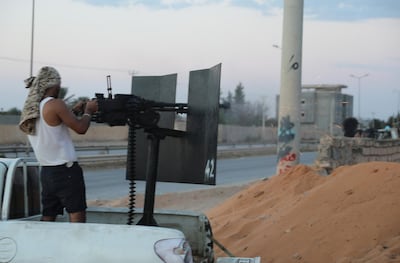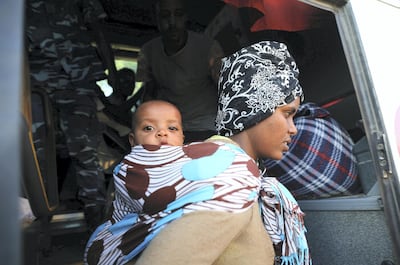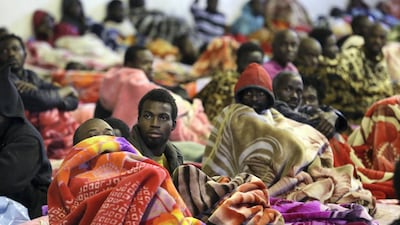The EU's migration policy has left hundreds of refugees returned to Libya locked in detention centres close to frontlines drinking toilet water to stay alive or being forced to move and pack weapons for armed groups amid a new outbreak of the conflict, according to firsthand accounts given to The National.
Over the past month, Tripoli has experienced the worst fighting in years, as rival militias vied for control of the city. Though a ceasefire was announced on Wednesday, it is uncertain how long it will hold. A previous accord, signed on September 4, lasted only a few days.
Meanwhile, the United Nations Refugee Agency (UNHCR) deputy high commissioner Kelly Clements said the organisation has evacuated most of its own staff and so can’t offer assistance to migrants and refugees still trapped in the city.

An estimated 8,000 men, women and children were being held in Tripoli detention centres run by the Libyan Department for Combatting Illegal Migration (DCIM) before the fighting broke out on August 26. Already the conditions were criticised by aid and human rights groups for being inhumane. Most were returned to Libya earlier this year by the EU-backed Libyan coastguard after trying to reach Italy.
Some have since been moved to other parts of the city or country while some were “released” from the centres. Several of those let go accidentally ran into gunfire because they had no idea which way to head, according to witnesses who were present.
Refugees and migrants in three separate centres have told The National they're desperate for aid and evacuation and say that fighting meant they had to go up to five days straight without food over the past month.
“We are in the middle area of the clash,” one Eritrean man said in a WhatsApp message. “To tell you the truth we did not even sleep for about six days. Heavy weapons and gunfire pass over us.”
Another Eritrean national being held in Abu Salim detention centre in southwest Tripoli told The National that more than 400 detainees were woken early on Monday morning to the sound of rockets landing close by. "Everybody was woken from sleep because we hear the sound of heavy weapons near to us, so the women and children are crying," he said.
______________
Read more:
Tripoli chaos worsens as Al Qaeda joins the fighting
Spain rescues more than 440 migrants from boats in Mediterranean
Tripoli ceasefire broken as airport shelled
______________
On Tuesday, 10 Eritrean and Ethiopian nationals were taken from Abu Salim centre and forced to spend hours moving weapons for militias. "They make them work like putting heavy weapons in a car but they [didn't] touch them," the man told The National explaining they were unharmed. Detainees kept elsewhere in Tripoli said they had been forced to pack bullets in the early days of the fighting.
Doctors Without Borders (MSF), which provides medical care to migrants and refugees in Libya, has been calling for urgent evacuations since September 7. “Several detention centres in Tripoli are on front lines and thousands of desperate people are still trapped inside. There is a real risk of mass casualties as a result of indiscriminate shelling and artillery fire," said Ibrahim Younis, MSF’s head of mission in Libya.
Apart from urgent medical, food and water needs, refugees and migrants from countries including Sudan, Ethiopia, Somalia and Eritrea, have been pleading to be registered with UNHCR.

In three detention centres where detainees were reached by The National, only between a quarter and a half of people from seven recognised refugee-producing countries were registered before the fighting broke out. Some say they've waited up to eight months, and worry they won't be considered for evacuation and could be kidnapped by traffickers because there is no official record of their detention.
UNHCR said the dangerous security situation means access is difficult. “Unless we’re able to expand our reach inside the country it’s going to be hard for us to continue to evacuate those in need of international protection”, Ms Clements said from the UN General Assembly in New York.
“To the extent that we can access them, we’re trying to evacuate them as quickly as we can, but with the current fighting we’re also conscious that we don’t want to lose our team members lives, so we have to wait for a lull in the current conflict in order to recommence”, she said.
This week, the last private rescue ship operating in the Central Mediterranean, the Aquarius, had its registration revoked, meaning dwindling escape routes are closing down. “This decision condemns hundreds of men, women, and children to death,” MSF, which operated the boat, said in response. Already, one person was dying at sea for every 18 that successfully make it to Europe from Libya, according to a report released by UNHCR earlier this month. The survival rate is expected to deteriorate.

Libya has become the main Mediterranean departure point for migrants and refugees trying to reach Europe. Since February 2017, the EU has been funding the Libyan coastguard to intercept people trying to make the crossing and return them to Libya. Many are locked in indefinite detention where human rights groups have documented abuses including rape, forced labour, torture and extortion.
Among those locked up are women and children. In Abu Salim detention centre, one woman gave birth two weeks ago and several other pregnant women are close to term.
Around 640 children are currently being held in “official” detention centres, according to Unicef. “Given human rights violations reported in official immigration detention centres, this is particularly alarming, with children exposed to physical and mental abuse, sexual exploitation and forced separation from their families and loved ones,” said Unicef special representative in Libya, Abdel-Rahman Ghandour.
One month after the fighting began, refugees in Tripoli say they feel completely abandoned by both the EU and the UN, and often think they’re just waiting to die. “We are losing hope, even from God,” one said.

